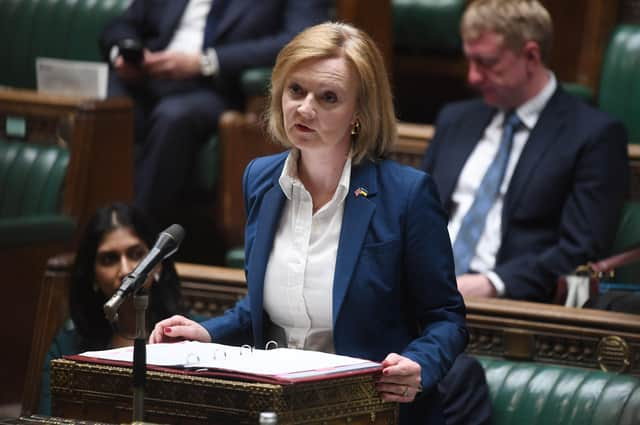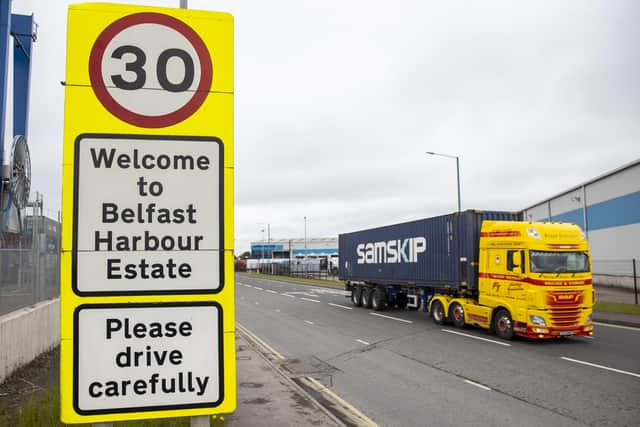Owen Polley: Brace yourselves for full-on barrage of lies and hysteria over the Protocol in the weeks ahead


Over the past few weeks, newspapers reported that ministers intended to ‘shred’ or ‘trash’ the Northern Ireland Protocol, based on off-the-record briefings.
To no-one’s surprise, Truss’s statement was a lot more circumspect and it contained many ideas that had been proposed before.
Advertisement
Hide AdAdvertisement
Hide AdThat’s not to say that it was not significant, but, based on their past experiences, unionists will be sceptical about the government’s intentions until effective legislation is on the statute book.


This is another promise to deal with the protocol, rather than action against it.
Truss said that a detailed description of the bill will be published only in ‘the coming weeks’.
But the plans she set out sounded a lot like Lord Frost and Brandon Lewis’s ‘command paper’ that was rejected by the EU last summer.
Advertisement
Hide AdAdvertisement
Hide AdGoods from Great Britain, that are intended for Northern Ireland only, would travel through a ‘green lane’ at ports here, while a ‘red lane’ would deal with trade moving eventually to the Republic.
Perhaps more importantly, the government would implement a ‘dual system’ of standards, so that companies could adhere to British or EU rules and regulations.
Equally significantly, the legislation would ensure that Brussels had no say over the tax, VAT and subsidy regimes in Northern Ireland.
At first glance, these measures deal with the three main problems that unionists have with the protocol:
Advertisement
Hide AdAdvertisement
Hide Ad1) That it creates barriers for goods coming into NI from GB;
2) That it hands Brussels rather than London the right to set rules and regulations that govern our economy;
3) That the European Court of Justice ultimately adjudicates on many economic laws here, even when they affect only domestic trade.
The first problem creates many short-term issues for businesses and the economy.
But the last two are, if anything, more important.
Advertisement
Hide AdAdvertisement
Hide AdThey affect our constitutional position directly, threatening to dilute the Union continuously and push us ever further from the rest of the UK economically and politically.
The government should have identified these aspects of the sea border as unacceptable before it signed the protocol, of course, but at least it recognises them accurately now.
That has been the case, though, for at least a year, and it has done nothing yet to put them right.
Unionists will be worried by Ms Truss’s pledge to keep negotiating with the EU while the legislation is prepared, even if it is aimed at maintaining the moral high ground.
Advertisement
Hide AdAdvertisement
Hide AdHer statement set out the minimum measures that could restore Northern Ireland’s full place in the UK internal market and repair the Union.
It cannot be considered an opening gambit for a new stage of talks.
While the EU was said to have rejected the foreign secretary’s proposals immediately, yesterday the Daily Telegraph reported that Maros Sefcovic, its chief negotiator, was open to more discussions about reducing checks.
The paper claimed he was prepared to “virtually eliminate all customs and food safety checks”, along the lines of temporary arrangements Brussels agreed for medicines.
Advertisement
Hide AdAdvertisement
Hide AdYou could fairly ask why, if the EU really can make this offer now, it waited so long.
At the same time, it is dangerous territory, because it may be tempting for businesses to make the immediate pain go away, even though, potentially, the ‘solution’ is only temporary and leaves Brussels’ authority over our economy intact.
The fact that the government wants to legislate, rather than, for example, triggering Article 16 first and stopping checks immediately, raises more questions.
Does it really intend to act or just improve its negotiating position? How long will it take to pass the law? Some estimates say it could be over a year.
Advertisement
Hide AdAdvertisement
Hide AdAlready, there are suggestions that pro-EU and pro-Dublin elements of the Conservative Party, never mind other parties, may oppose the legislation, or that it will be amended out of all recognition by the time it gains royal assent.
All the hysteria, lies and exaggeration that have accompanied every attempt to solve the sea border issue will be at full pitch in the next few weeks.
A proposal by the government to make it easier and cheaper to bring goods into Northern Ireland will be portrayed as an irresponsible outrage.
The political parties who make that argument here are determined either to distance us from the rest of the UK or keep us tied as closely as possible to the EU.
Advertisement
Hide AdAdvertisement
Hide AdThey pose as pragmatic and practical, but they’re driven by ideology and sovereignty at least as much as unionists, and they’re prepared to damage our economy and stability to protect their favoured outcomes.
The government should not for an instant follow these flagrant hypocrites’ advice, but don’t be surprised if it eventually does.
MORE OPINION: